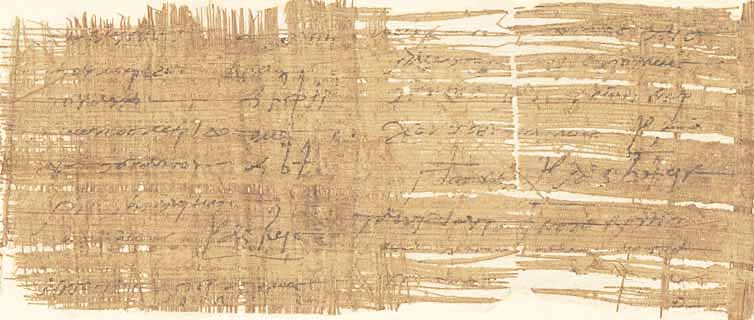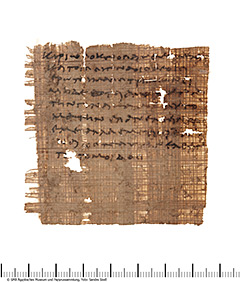SB XVIII 14043 (P. 21712)
Help in the marriage crisis? In ancient Egypt this could be sought in ancient Egypt from the gods who were asked for help with oracular questions. A beautiful and almost complete example of such a oracular question in Greek is offered by the papyrus presented here.
It was found in the ruins of the ancient village of Soknopaiou Nesos, today’s Dime on the north shore of the Birket Qarun in the Fayum oasis. Almost half of all known Greek oracular questions from Egypt come from this place. Together with other oracular questions, this papyrus was found in the ruins of a house near the temple walls. This is reported by Friedrich Zucker in his diary, who was the head of the excavations in Dime in 1909. The papyrus came to Berlin together with other finds in a tin box with the label „Kom von Dime, 4.3.09“.
With the oracular question on this unilaterally inscribed papyrus, a certain Serenion seeks help from the gods for a situation that might have been a quarrel. Serenion asks if his wife, Ammonous, will not return to him, but he has to go out that she comes back. At first sight, that sounds complicated, as Serenion could have asked much more easily if his wife would come back to him or if he has to go out that she comes back. The reason for this lies in the special form of oracular questions to which this papyrus also belongs. These are so-called ticket oracles that only allow yes-no questions. The answer to the question was not a verbal yes or no. Instead, the questioner got back the papyrus containing the right question. A corresponding request to the called gods can be found at the end of such oracular questions. The positive or negative decision of the oracular question had to be included in the formulation of the question. This means that each question had to be formulated once positively and once negatively. The wording that corresponded to the decision was returned to the questioner.
Serenion also had to formulate his question once positively and once negatively. The negative version has been preserved in the present text. At the end of our text, Serenion also asks the gods to give him back this papyrus, if the question was in accordance with the decision. The gods that he invokes are Soknopaios and the gods worshiped with him in his temple, who are not named explicitly. Soknopaios is the main god and namesake of the place Soknopaiou Nesos, which means island of Soknopaios. Since the oracular question was found along with other oracular questions near the temple walls, it can be assumed that Serenion had got back the positive version of his question. The oracle had thus revealed that Ammonous voluntarily returned to Serenion.
However, one can only speculate about the background of this oracular question. It is certain that Ammonous had left her husband and he now asked the gods for information about her return. It is possible that the couple had a dispute after which Ammonous left her husband’s house. But this is not certain, as other explanations are also possible. It is also uncertain where Ammonous is. Maybe she went back to her family. The wording of the oracular question, however, suggests that Serenion knew where his wife was, as he would get her if she did not return to him voluntarily. Unfortunately, we do not know how that story ended because we have no information about this couple.
The oracular questions to gods offered help in situations that probably were to complicated those concerned. The topics covered in this way are widely spread. The most common are oracular questions about illness or private life, as in the case presented here.



